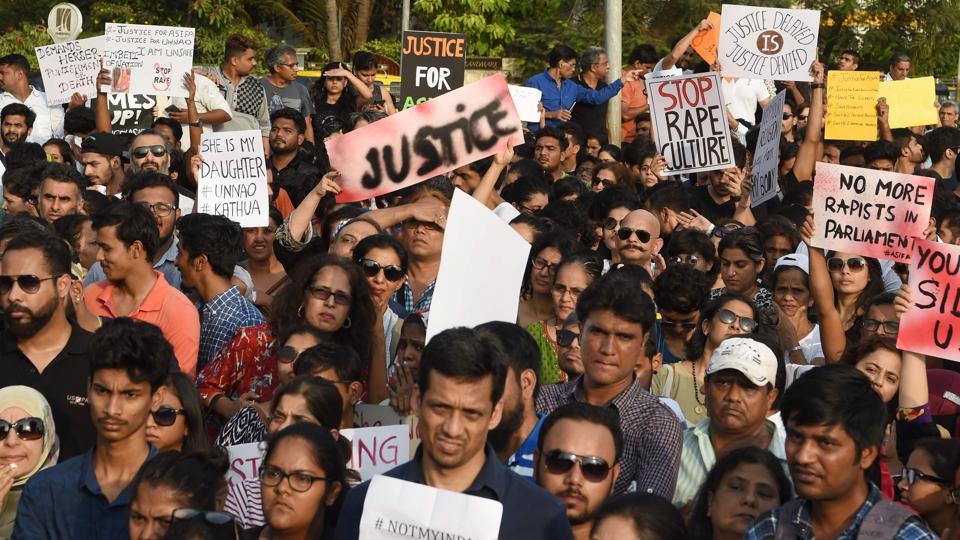As India comes to terms with Kathua and Unnao, outrage has been spreading – like soft butter on warm toast. Many young Indians today are vocal on the internet- people should know that we are angry and have an opinion about the latest travesty. They should know that we have the correct moral opinion on the matter of the day. And boy, is it satisfying to tell the world about one’s moral superiority through social media’s loudspeaker.
Facebook and Twitter timelines are full of people expressing their rage – at the government, at people, at rapists, at lawmakers, even themselves. ‘I am ashamed’ is becoming a common admission of culpability in today’s rape ridden milieu.
In a picture from a protest in Mumbai last week, one can see a smiling actor holding a placard that declares, ‘India Unites for Justice Against Rape and Murder’. This visual made me think about placard-holding, loudspeaker-carrying individuals who attend candlelight marches across the country. Even so, is India truly united for justice presently? Or are we more divided than ever? As I write this, there are several factions out there trying to prove that the Kathua rape didn’t happen, and others insist on siding with the accused.
Considering this, holding a placard is equivalent to embracing delusion and ignorance. Sure, it feels good to demonstrate your compassion for a cause. But that’s about all it is – an emotion. It seldom moves the wheels of policymaking. Placards that announce solidarity on behalf of the country, while good to look at, are sometimes, far from factual, like in the case above.
Those who have been protesting should ask themselves some questions. Are protests at large a self-congratulatory display? Has outrage become a ‘thing’? Is it just another symptom of our social media-induced narcissism?
Good intentions alone aren’t enough to affect good change.
Clinical psychologist Jordan Peterson has advice for such well-meaning, albeit change makers.
In ‘My Message to Millenials‘, Peterson states, “There’s a problem and it’s that young people want to change the world”. Then he cautions listeners, “… unless the individual straightens out his or her own soul, there is no possibility that the impact an individual can have on society can be anything but harmful”.
Peterson makes the point that young changemakers often blame people and actively look for victims. An approach, which according to him, causes more harm than good. His idea is simple – straighten yourselves out before you lash out.
Social media rants are another example of such lashing out. A Facebook comment questioning protestors’ intentions in the Kathua rape case will immediately elicit a retort about not making it a ‘communal issue’ at which point someone else will make a ‘you support rape’ allegation.
Since we seem unclear on this – rape is a crime and announcing that you denounce it doesn’t deserve accolades.
Peterson urges wide-eyed change makers to get to the truth – the only way towards social improvement, he says. But how do we apply his advice to our current situation? We make our outrage constructive.
Cultural problems don’t go away with band-aid solutions like the ones we’ve come up with so far. We need to think about concrete measures we can take now and not just cultural shifts that will take years to manifest. For instance, those blaming the police for the state of our country should know that as of 2016, India was short of over five lakh police personnel. According to the government, the ideal ratio is one police officer for every 547 citizens. In a recent op-ed, police officer Abhinav Kumar pointed this out, “Outrage alone is not going to show us the way forward. The way forward lies in painstaking investment in police resources.”
Yet there are others on the internet who want to stay away from making the Kathua case a communal issue – neglecting the fact that the child was raped because she was a Muslim nomad. Wanting to detach the communal part amounts to ignoring the root cause of the problem – religious fanaticism?
Pausing before typing out an anger-induced comment on Facebook is all it takes to look at the larger picture of a circumstance. A rant is what it is – desperate noise – the more people indulge in it, the louder it gets, the blurrier the vision, and the more distant the solutions. Potential change makers are trapped in a world of delusion, getting engulfed by the vortex of social media validation – and somebody needs to tell them that.
Mehr Gill is based in Chandigarh and is currently pursuing a reporting internship at The Indian Express. She is 22 years old

